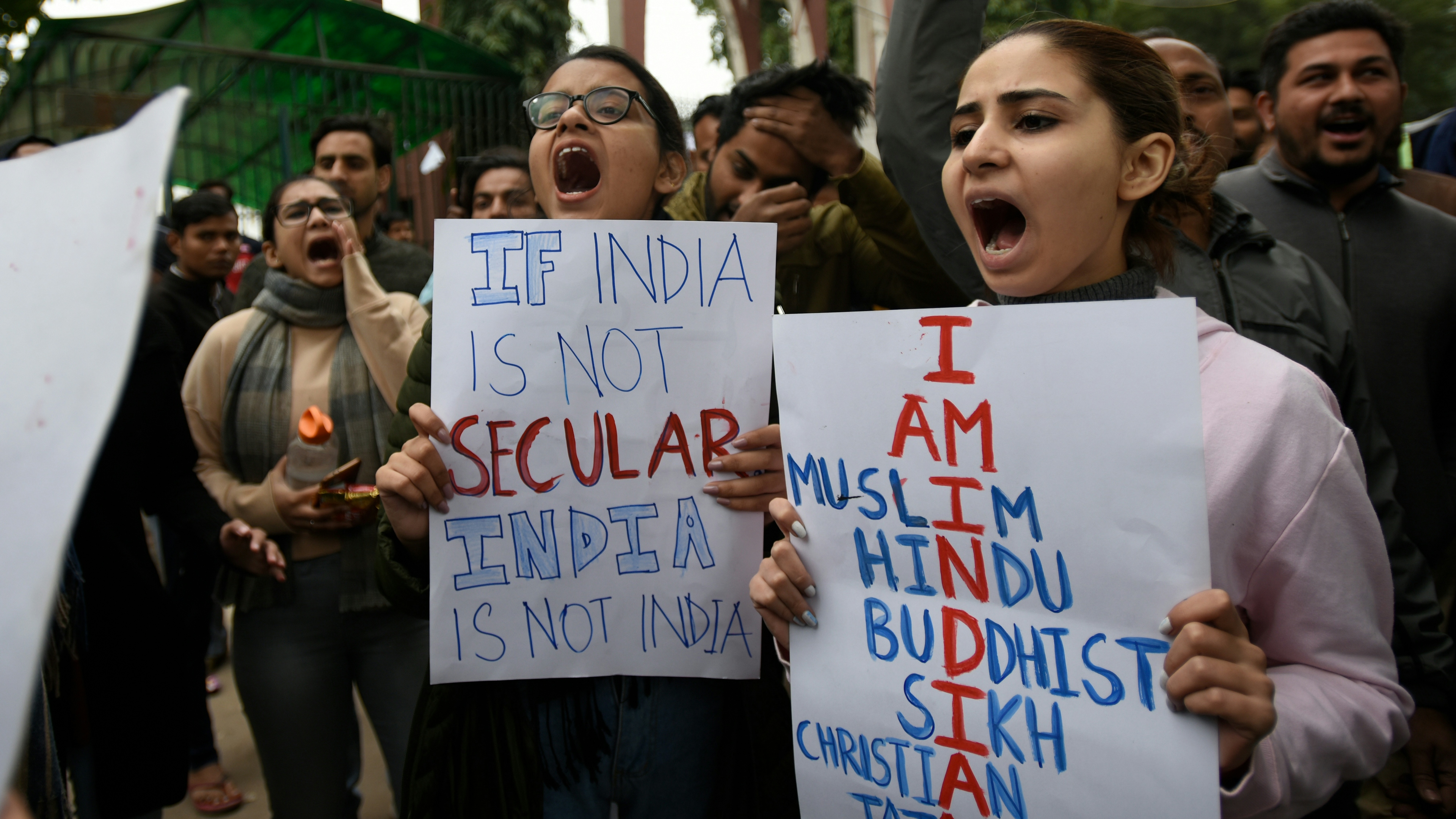INDIA
The Story
The situation in India is becoming more violent.
Refresh my memory.
Last week, India passed a law that uses religion as a way to determine citizenship. The law was set up to grant citizenship to religious minorities from three neighboring countries: Bangladesh, Pakistan, and Afghanistan. That includes Hindus, Sikhs, and Buddhists. But it excludes Muslims. People across the country have been protesting. At least six people have died. And protests aren't going away.
I'm listening.
So far, demonstrations have taken place in at least 17 cities. In the northeastern part of India, protesters took to the streets over fears that more immigrants from Bangladesh could lead to cultural shifts or more job competition. In other parts of India, people are protesting a law they believe marginalizes Muslims. Earlier this week, police fired tear gas and beat unarmed students at a university campus in Delhi, injuring hundreds. But the protests are more than just about the citizenship law.
Go on.
Critics say the law is the latest effort by Prime Minister Narendra Modi to carry out his party's Hindu nationalist agenda (see: this, this, and this). UN officials and international advocacy groups are calling the law discriminatory. Other opponents say it violates the secular nature of India's constitution. But Modi says that the law is only "for those who have faced years of persecution outside and have no other place to go except India." In response to the protests, he's called for calm – a message that's unlikely to have reached everyone, since the gov has shut down the internet in some areas.
theSkimm
Protesters are angry with the new citizenship law for a variety of reasons. More than anything, this is exposing fault lines over Modi's Hindu nationalist agenda – largely seen to be alienating the country's 200 million Muslims.
AND ALSO...THIS
Who's been sentenced…
Pervez Musharraf. Today, a Pakistani court sentenced the country's former military ruler to death on charges of high treason. Back in 2007, Musharraf imposed a state of emergency and suspended the country's constitution, affecting civil liberties and human rights. Musharraf resigned a year later to avoid impeachment. His sentence is the first time in Pakistan's history that an army chief has been held accountable for his actions while in power. Musharraf – who has been in self-imposed exile in Dubai – has the option to appeal.
What's decided not to decide…
SCOTUS. Yesterday, the Supreme Court decided not to hear an appeal on a law that would have made it a crime to sleep in public places. The law – from Boise, Idaho – was designed to better regulate makeshift encampments. And argued that this was needed to maintain the "health and safety" of communities. But a lower court said that the law was a violation of the Constitution's ban on cruel and unusual punishment. And that the consequences of experiencing homelessness shouldn't be a crime. By letting the lower court ruling stand, the public encampments are apparently protected under the Constitution, at least for now.
What's pressing 'pause'...
Boeing. Yesterday, the company said it will temporarily halt production of its 737 Max plane next month – the one involved in two fatal crashes, killing 346 people. The planes have been grounded for months, while the FAA has been re-examining whether they're safe to fly. It's believed to be the worst crisis to hit Boeing in the company's 103-year history, costing the company billions. Now, the FAA isn't expected to clear the planes until next year. And since Boeing is one of the US's largest manufacturing companies, the announcement could impact the broader US economy. For now at least, Boeing isn't laying off the 12,000 workers in Washington State who've been working on the plane.
Why e-cigs are causing concern again...
This study. It's considered to be the first to examine the long-term effects of electronic cigarettes. After looking at e-cig users for three years, researchers apparently found that people who used e-cigarettes were 30% more likely than non-users to develop respiratory diseases (like asthma, bronchitis). Worth noting: those who used traditional cigarettes – either in combination with e-cigs or on their own – were even more at risk.
What Billboard is saying to Mariah...
Live Smarter
Sign up for the Daily Skimm email newsletter. Delivered to your inbox every morning and prepares you for your day in minutes.






